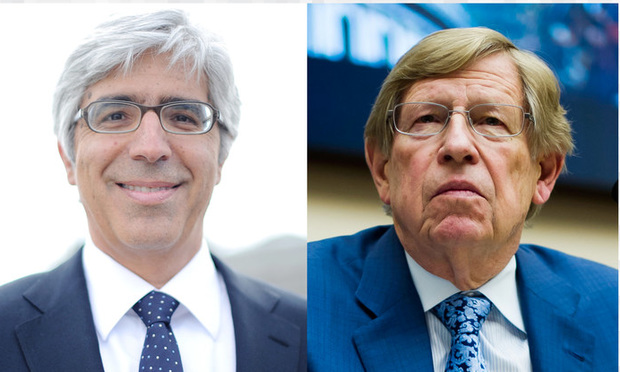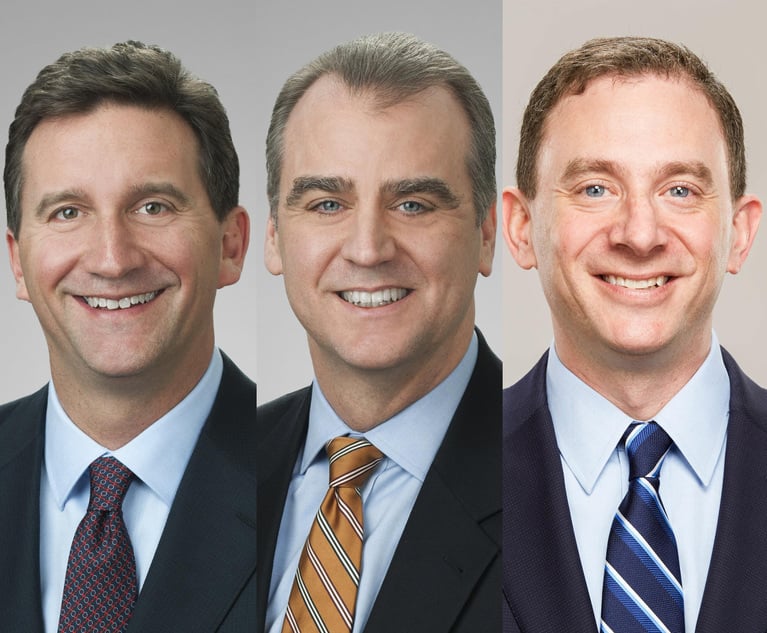Litigators of the Week: Gibson Dunn's Two Teds Score for the Free Press
Ted Boutrous and Ted Olson led a team that jumped into action when the White House revoked the press pass of CNN's Jim Acosta, suing to force the Trump administration to restore his access.
November 30, 2018 at 03:34 PM
6 minute read
 Theodore J. Boutrous Jr., left, and Theodore B. Olson, right, partners with Gibson, Dunn & Crutcher.
Theodore J. Boutrous Jr., left, and Theodore B. Olson, right, partners with Gibson, Dunn & Crutcher.
Our Litigators of the Week are Gibson, Dunn & Crutcher's two Teds: Theodore Boutrous and Theodore Olson. They led a team that jumped into action when the White House revoked the press pass of CNN's Jim Acosta, suing to force the Trump administration to restore his access.
Boutrous discussed the case with The Lit Daily.
Lit Daily: Walk us through the events that led up to the litigation.
Ted Boutrous: On November 7, CNN's chief White House correspondent Jim Acosta attended the President's press briefing following the mid-term elections. Mr. Acosta asked the President several tough questions, which the President answered by attacking CNN as the “enemy of the people” and calling Mr. Acosta “rude.”
That evening, as Mr. Acosta was returning to the White House for a news report, the Secret Service confiscated his “hard pass”—the credentials that give him access to White House grounds. Press Secretary Sanders tweeted that Jim's pass had been revoked because he had “placed his hands on” a White House intern who had tried to take the microphone from him at the press conference, a false accusation she supported by tweeting out a doctored video. Without his press pass, Jim could no longer do his job.
When and how did the Gibson Dunn team get involved?
As soon as I heard the news, I reached out to David Vigilante, the assistant general counsel at Turner, as well as Ted Olson. Ted and I had worked with David on other major First Amendment matters for CNN and the three of us developed a game plan and strategy.
Ted and I immediately assembled a team with deep knowledge of First Amendment law, including our partners Anne Champion and Josh Lipshutz. They were ready to jump right in that night.
Beyond one reporter's press pass, what was at stake?
The freedom of the press to gather and report the news about the President and the White House, and the public's right to scrutinize the government's activities. The revocation of Mr. Acosta's “hard pass” was the culmination of over two years of attacks on CNN, Mr. Acosta, and journalism itself. The entire industry saw how critical this case would be, as shown by the outpouring of public support we received from dozens of news organizations around the world—everyone from the New York Times to the Washington Post to Fox News.
To what extent has an incident like this happened before?
It hasn't. Many presidents have been frustrated with the press, but we could not find any precedent for the revocation of a White House press pass. This was truly an extraordinary event and that's why it was so important to fight back.
What were some key precedents?
In Sherrill v. Knight, the D.C. Circuit held there is a First Amendment interest in a White House press pass, and access cannot be “denied arbitrarily or for less than compelling reasons.” 569 F.2d 124, 129 (D.C. Cir. 1977). Under that precedent, a White House reporter cannot be excluded from White House grounds without due process of law, including notice of the reasons for the denial, meaningful standards, and an opportunity to be heard. We also drew support from many Supreme Court decisions prohibiting content and viewpoint discrimination by the government, as well as landmark First Amendment cases like New York Times v. Sullivan.
This case unfolded very quickly. How was the team able to mount such a rapid response?
We had already looked at some of these issues when the White House had sought to exclude journalists from other press events, so we had a good head start. But we had to develop both the factual record and legal arguments within a matter of days, so we divided up responsibility, with Anne Champion leading the fact team, Josh Lipshutz leading the briefing team, and Ted Olson and I working with them and the clients to put it all together into a compelling narrative.
How did you prepare for oral argument?
Quickly. We filed on Tuesday morning, November 13, received the government's TRO opposition papers at 11 a.m. Wednesday morning, and had only four hours to prepare for the 3 p.m. hearing that afternoon. We anticipated much of what the government would argue, though we were surprised by the breadth of the presidential powers the government was seeking. We quickly crafted rebuttal arguments, held a mini-moot with the clients, and walked into court ready for anything.
The argument before Judge Timothy J. Kelly lasted more than two hours. What were some of highlights?
The government took an extremely broad position, telling the court that the President “can discriminate based on viewpoint; based on content; based on whether he thinks you'll get good coverage.” That is simply not the law. When Judge Kelly asked me about the government's original rationale for expelling Mr. Acosta—his supposed “placing of the hands” on a White House intern—I said it was “absolutely false.” When the government attorney got up, he admitted that “the hands on the intern issue” is one “that we don't have in the brief” and that “we're not relying on here.”
Judge Kelly granted your motion on November 16 in an oral ruling from the bench. What did the court hold?
The court found that CNN and Mr. Acosta had a “First Amendment liberty interest” in Mr. Acosta's press pass and ordered that Mr. Acosta's press pass be immediately restored. As the court held, the White House's initial explanation for the revocation—that Mr. Acosta “placed his hands” on the White House staffer—was “likely untrue” and based on “evidence of questionable accuracy.” The court concluded that whatever process had been used to revoke Mr. Acosta's hard pass was “shrouded in mystery,” and found that Mr. Acosta and CNN would incur irreparable harm “every day” the government continued to infringe their constitutional rights.
This wasn't the end. What happened next and how did you respond?
We got the TRO Friday morning, and Jim was back to work at the White House that afternoon. At 9 p.m. that night, Jim received a letter from the White House telling him his pass was once again going to be suspended based on the November 7 press conference and demanding a response by Sunday. This forced us to go back to the court on Monday morning with another emergency filing. Finally, at 3 p.m. on Monday, the White House backed down and informed Jim that his hard pass had been “restored.” The case was over.
What do you think is the wider importance of this case? What message does it send?
That the courts will serve as a check on the White House if it violates the First Amendment rights of the press and the public.
This content has been archived. It is available through our partners, LexisNexis® and Bloomberg Law.
To view this content, please continue to their sites.
Not a Lexis Subscriber?
Subscribe Now
Not a Bloomberg Law Subscriber?
Subscribe Now
NOT FOR REPRINT
© 2025 ALM Global, LLC, All Rights Reserved. Request academic re-use from www.copyright.com. All other uses, submit a request to [email protected]. For more information visit Asset & Logo Licensing.
You Might Like
View All
Litigators of the Week: Shortly After Name Partner Kathleen Sullivan’s Retirement, Quinn Emanuel Scores Appellate Win for Vimeo

Litigators of the Week: A Knockout Blow to Latest FCC Net Neutrality Rules After ‘Loper Bright’

Litigators of the (Past) Week: Defending Against a $290M Claim and Scoring a $116M Win in Drug Patent Fight

Litigation Leaders: Jason Leckerman of Ballard Spahr on Growing the Department by a Third Via Merger with Lane Powell
Trending Stories
Who Got The Work
J. Brugh Lower of Gibbons has entered an appearance for industrial equipment supplier Devco Corporation in a pending trademark infringement lawsuit. The suit, accusing the defendant of selling knock-off Graco products, was filed Dec. 18 in New Jersey District Court by Rivkin Radler on behalf of Graco Inc. and Graco Minnesota. The case, assigned to U.S. District Judge Zahid N. Quraishi, is 3:24-cv-11294, Graco Inc. et al v. Devco Corporation.
Who Got The Work
Rebecca Maller-Stein and Kent A. Yalowitz of Arnold & Porter Kaye Scholer have entered their appearances for Hanaco Venture Capital and its executives, Lior Prosor and David Frankel, in a pending securities lawsuit. The action, filed on Dec. 24 in New York Southern District Court by Zell, Aron & Co. on behalf of Goldeneye Advisors, accuses the defendants of negligently and fraudulently managing the plaintiff's $1 million investment. The case, assigned to U.S. District Judge Vernon S. Broderick, is 1:24-cv-09918, Goldeneye Advisors, LLC v. Hanaco Venture Capital, Ltd. et al.
Who Got The Work
Attorneys from A&O Shearman has stepped in as defense counsel for Toronto-Dominion Bank and other defendants in a pending securities class action. The suit, filed Dec. 11 in New York Southern District Court by Bleichmar Fonti & Auld, accuses the defendants of concealing the bank's 'pervasive' deficiencies in regards to its compliance with the Bank Secrecy Act and the quality of its anti-money laundering controls. The case, assigned to U.S. District Judge Arun Subramanian, is 1:24-cv-09445, Gonzalez v. The Toronto-Dominion Bank et al.
Who Got The Work
Crown Castle International, a Pennsylvania company providing shared communications infrastructure, has turned to Luke D. Wolf of Gordon Rees Scully Mansukhani to fend off a pending breach-of-contract lawsuit. The court action, filed Nov. 25 in Michigan Eastern District Court by Hooper Hathaway PC on behalf of The Town Residences LLC, accuses Crown Castle of failing to transfer approximately $30,000 in utility payments from T-Mobile in breach of a roof-top lease and assignment agreement. The case, assigned to U.S. District Judge Susan K. Declercq, is 2:24-cv-13131, The Town Residences LLC v. T-Mobile US, Inc. et al.
Who Got The Work
Wilfred P. Coronato and Daniel M. Schwartz of McCarter & English have stepped in as defense counsel to Electrolux Home Products Inc. in a pending product liability lawsuit. The court action, filed Nov. 26 in New York Eastern District Court by Poulos Lopiccolo PC and Nagel Rice LLP on behalf of David Stern, alleges that the defendant's refrigerators’ drawers and shelving repeatedly break and fall apart within months after purchase. The case, assigned to U.S. District Judge Joan M. Azrack, is 2:24-cv-08204, Stern v. Electrolux Home Products, Inc.
Featured Firms
Law Offices of Gary Martin Hays & Associates, P.C.
(470) 294-1674
Law Offices of Mark E. Salomone
(857) 444-6468
Smith & Hassler
(713) 739-1250






